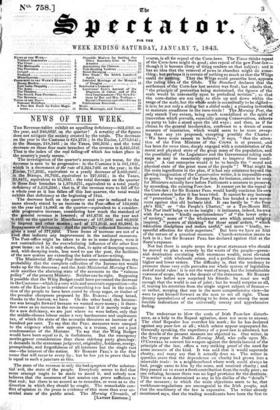NEWS OF THE WEEK.
THE Revenue-tables exhibit an appalling deficiency-922,6301. on the year, and 940,0621. on the quarter ! A scrutiny of the figures does not mitigate the anxiety created by the totals. The decrease on the year in the Customs is 824,2751. ; in the Excise, 1,173,6141.; in the Stamps, 218,346/. ; in the Taxes, 209,319/. ; and the total decrease on those four main branches of the revenue is 2,425,554/. That is the index of the real falling-off which has taken place in the country's yearly means.
The investigation of the quarter's accounts is, yet worse, for the decrease is seen to be progressive: in the Customs it is 581,1851., which is a decrement at the rate of 2,324,7401. on the year ; in the
Excise, 717,2621., equivalent to a yearly decrease of 2,869,0481.; in the Stamps, 56,7631., equivalent to 227,0521.; in the Taxes, 23,8471., equivalent to 95,3881.: the total decresse on the quarter in those four branches is 1,379,0571., equivalent to a total yearly deficiency of 5,516,2281.; that is, if the revenue were to fall off for a whole year as it has fallen off this last quarter, the total would exhibit that deficiency at the beginning of 1844. The decrease both on the quarter and year is reduced to the sums already stated by an increase in the Post-office of 150,0001. on the year and 14,000/. on the quarter—equivalent to it consider- able progressive increase, considering how much the standard of the general revenue is lowered; of 481,673/. on the year and 6,4851. on the quarter in Miscellaneous ; of 157,2831. and 80,9101. in imprest and other monies ; apd of 171,9121. and 89,388/. in Repayments of Advances. And the partially-collected Income-tax gives a total of 571,0561. These items of increase are not of a kind that indicate any improvement in the national resources. The Post-office might be-taken to do so in some degree, were it -not contradicted by the overwhelming influence of the other four great items: as it is, it only shows, that, in spite of decaying means, and, with decaying trade, less need to use the post, the facilities of the new system are extending the habit of letter-writing.
The Ministerial Morning Post derives some consolation from the probability that the complete collection of the Income-tax would make up for the decrease ; and the Anti-Ministerial Morning Chro- nicle ascribes the alarming state of the accounts to the "ruinous policy " of the present Ministry. Neither can be right. Supposing it possible that the Whig Budget could have prevented the decrease in the Customs—which is a very wide and uncertain supposition—the state of the Excise is evidence of something too bad in the condi- tion of the people to have been cured by cheap sugar, or timber of the peculiar cheapness proposed by Mr. BARING : cheap bread, thanks to-the harvest, we have. On the other hand, the Income- tax was brought forward because we wanted more money ; it there- fore owes us an increase in the revenue : but if it merely make up for a new deficiency, we are just where we were before, only that the middle-classes labour under a very burdensome and unpleasant tax, of which the state of the accounts threatens an increase of a hundred per cent. To say that the PEEL measures were unequal to the exigency which now appears, is a truism, yet not a just condemnation of the Minister. To say that the Whig Budget would have been equal to it, is foolishness. But the emergency meritssraver consideration than these sidelong party glancings : it demands in the statesman judgment, originality, boldness, energy, promptitude, and forgetfulness of all interests but the single vast one—the interest of the nation. Sir ROBERT PEEL'S is the first name that will recur to every lip ; but he has yet to prove that he is equal to such a juncture as this.






























 Previous page
Previous page